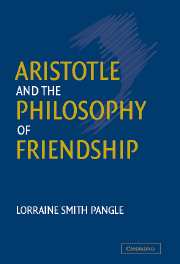Book contents
- Frontmatter
- Contents
- Acknowledgments
- Introduction
- 1 The Challenge of Plato's Lysis
- 2 The Three Kinds of Friendship
- 3 Aristotle and Montaigne on Friendship as the Greatest Good
- 4 Friendships in Politics and the Family
- 5 Cicero's Laelius: Political Friendship at Its Best
- 6 Quarrels, Conflicting Claims, and Dissolutions
- 7 Friends as Other Selves
- 8 Goodwill, Concord, and the Love of Benefactors
- 9 Self-Love and Noble Sacrifice
- 10 Friendship in the Happy Life
- Notes
- Bibliography of Modern Works and Editions
- Index of Names
9 - Self-Love and Noble Sacrifice
Published online by Cambridge University Press: 04 July 2009
- Frontmatter
- Contents
- Acknowledgments
- Introduction
- 1 The Challenge of Plato's Lysis
- 2 The Three Kinds of Friendship
- 3 Aristotle and Montaigne on Friendship as the Greatest Good
- 4 Friendships in Politics and the Family
- 5 Cicero's Laelius: Political Friendship at Its Best
- 6 Quarrels, Conflicting Claims, and Dissolutions
- 7 Friends as Other Selves
- 8 Goodwill, Concord, and the Love of Benefactors
- 9 Self-Love and Noble Sacrifice
- 10 Friendship in the Happy Life
- Notes
- Bibliography of Modern Works and Editions
- Index of Names
Summary
In Chapter 8, Aristotle provides the capstone of the argument he has been building that the best friend is not another but oneself. He thereby demonstrates that the most important thing for happiness is not to have a good friend in another but to have the right stance toward oneself and the capacity to secure what is good for oneself, especially for one's soul or mind. Aristotle does not bend his efforts to making the case that all men in fact love themselves most of all, although he clearly indicates that they do. For showing that all the actual men that we know love themselves most would not prove that the rarest and best man, leading the best possible life, might not love others more. Instead, he makes the more radical claim that the greatest self-love is characteristic of the very best people, even or especially in their moments of seemingly greatest self-sacrifice; and what is more, that the truest form of self-love, in the best individuals, does in fact take precedence over everything and everyone else. In the process, Aristotle illuminates the difference between the self-love of ordinary people and that of the most moral citizens, while prompting some reflections upon the self-love of a third group, the philosophic souls who possess complete self-understanding.
The Goodness of Self-Love
Aristotle begins from the obvious truth that self-love is almost universally an object of reproach.
- Type
- Chapter
- Information
- Aristotle and the Philosophy of Friendship , pp. 169 - 182Publisher: Cambridge University PressPrint publication year: 2002



